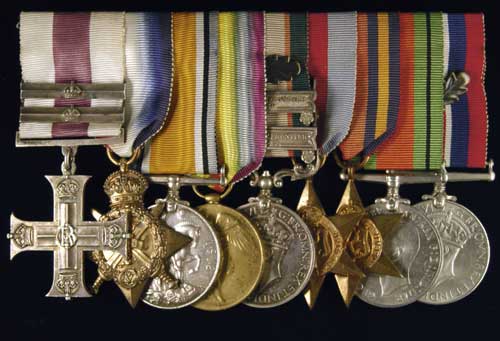
Auction: 7012 - Orders, Decorations, Medals & Militaria
Lot: 562
The Rare and Outstanding Great War Western Front M.C. and Two ´Immediate´ Bars Group of Nine to Brigadier W. Swinton, Royal Field Artillery, Thrice Wounded During the Great War; Officer Commanding 17th Battery 23rd Mountain Brigade, Waziristan, 1937-38, Mentioned in Despatches, and Officer Commanding 20 Anti-Tank Regiment at Dunkirk, For Which He Was Also Mentioned in Despatches a) Military Cross, G.V.R., reverse engraved ´Captain W. Swinton Royal Field Artillery New Years Honours 1918´, with Second and Third Award Bars b) 1914 Star (2.Lieut: W. Swinton. R.F.A.) c) British War and Victory Medals (Major W. Swinton.) d) India General Service 1936-39, two clasps, North West Frontier 1936-37, North West Frontier 1937-39, M.I.D. Oakleaf, 2nd clasp loose on riband as issued (Major W. Swinton. M.C., R.A.) e) 1939-1945 Star f) Burma Star g) Defence and War Medals, M.I.D. Oakleaf, very fine or better, mounted as originally worn, with two Mentioned in Despatches Certificates, dated 13.4.1939 and 20.12.1940 (9) Estimate £ 4,000-4,500 M.C. London Gazette 1.1.1918 Capt. (A./Maj.) William Swinton, R.F.A. M.C. Second Award Bar London Gazette 24.9.1918 Captain (A./Maj.) R.F.A. ´For conspicuous gallantry and devotion to duty during an enemy attack. Having got his guns away, he gathered a few infantry and took up a position on the flank of another battery to defend its flank until more teams could arrive; he handled his small party with great skill causing many casualties among the enemy. On learning that they were cut off from behind; he held the enemy off until the guns were disabled, and retired with the infantry until they found their way back. Later when encountered by a party of the enemy, he personally took one of them prisoner.´ M.C. Third Award Bar London Gazette 15.2.1919 Capt. (A./Maj.) A./112th Bde. R.F.A. The citation London Gazette 30.7.1919 Capt. (A./Maj.) A./112th Bde. R.F.A. ´For conspicuous gallantry, coolness and skill under heavy fire east of Epehy on September 19th 1918. Observing that our infantry were held up in their attack on Ockenden Trench, he found the O.C. of the battalions taking part in the attack, and in consultation with them so directed the fire of his battery, which he observed from the most forward position possible, that the infantry were able to gain their objective with but small loss to themselves.´ M.I.D. London Gazette 17.10.1939 Swinton, Maj. (now Lt.-Col.) W., M.C. ´For distinguished services rendered in connection with the operations in Waziristan, North-West Frontier of India, 16.12.1937-31.12.1938´ M.I.D. London Gazette 20.12.1940 Lt. Col. (actg. Brig.) W. Swinton, M.C. ´in recognition of distinguished services in connection with operations in field. March-June, 1940.´ Brigadier William ´Bill´ Swinton, M.C. (1892-1964); educated at Charterhouse and the Royal Military Academy Woolwich; Second Lieutenant Royal Artillery, 23.12.1911; served during the Great War on the Western Front, 7.9.1914-16.9.1916 and 6.5.1917-11.11.1918 (wounded three times); Lieutenant 23.12.1914; Captain 8.8.1916; attached Machine Gun Corps, 7.11.1916-4.5.1917; posted to Deepcut, June 1919 and from there embarked for India with the 26th Field Brigade; Adjutant 22nd Brigade, 1.9.1922-10.10.1923; Major 18.5.1929; appointed Inspector General to the School of Artillery, India (Kakul); Officer Commanding 17th Battery, 23rd Mountain Brigade in Waziristan (M.I.D.); Lieutenant-Colonel 1.9.1938; Officer Commanding 20 Field - later 20 Anti-Tank Regiment, and took his Regiment to France, October 1939 (M.I.D. Dunkirk); Commander Corps Medium Artillery, 3 Corps, 26.6.1940-14.2.1941; Commander Corps R.A., 12 Corps, 8.3.1941-30.11.1941; Colonel 1.9.1941; Brigadier R.A., Ceylon Army Command, 14.3.1942-5.5.1943; Brigadier R.A., Army Group South East Asia Command, 1943-45; retired Honorary Brigadier 2.3.1946, ´he was essentially a regimental soldier - a Gunner whose technical and tactical efficiency impressed itself on all who served with him. It was Bill who was chosen for a period in the First World War, when recovering from a wound - to teach the newly formed Machine Gun Corps the A.B.C. of indirect fire. It was Bill again, in the Second War who for a period instructed the Tank Corps in Gunnery and gained their thanks as "the Tank Corps´ First Instructor in Gunnery. We owe him much." His skill and drive as a commander of a mountain battery (Waziristan 1937) an anti-tank regiment (Dunkirk 1940) earned him two mentions in despatches, and his reputation, when B.R.A. in Burma, was summarised by one of the staff of G.H.Q., F.A.R.E.L.F. in these words: "Last seen disappearing in the direction of the enemy carrying an F.O.0´s Wireless set." (Royal Artillery Institution Newsletter refers). Approximately 168 M.C. and Two Bars were awarded for the Great War.
Sold for
£7,500




